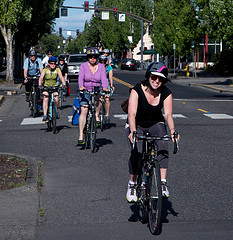
photo by Will Vanlue,
Creative Commons license
Big changes are coming and like it or not we are going to have to adapt. Yet most people are continuing on as if the next generation will more or less be facing the same challenges and living the same lifestyles as the previous one. We need to break out of our old thought patterns if we are going to begin a shift to a more sustainable lifestyle. For example, when I was a teenager I dreamed of my first car, it was a right of passage into adulthood. And now as a mother of a teenaged son, I would start to dream about what my son’s first car will be and how I would teach him to drive. Then I’d have to stop myself and think of what that will mean for the future and how his life will be different than mine or my parents. It seems a bit unfair that the heaviest part of this burden will fall on his and future generations, but that is where we are at and changing our habits sooner rather than later will make the transition a bit easier.
Change can be a scary thing for people. I’m sure you have heard from the doubtful types, “do you expect us all to go live in caves?” they ask. That’s fear talking. It’s hard for a lot of people to imagine doing things differently than how we’ve been doing it for so many years. They’ve been pretty good years for many of those people and it’s hard to fathom that the world may drastically change. But of course, we don’t need to all live in a cave. Many changes that we need to make can actually increase quality of life. Studies have shown that driving less is associated with increased happiness and better physical fitness. Eating in a more sustainable way can be healthier. Focusing less on consumerism allows us more time for meaningful experiences and relationships.
But even those of us that understand the need for change are having a hard time breaking free from those old habits. We get seduced by green-washing and the idea that we can have our same lifestyle if we just choose the “green” version of all the products we like to consume. We need to start questioning all that we do and making more of an effort to change. Things like electric cars, for example, can work in situations where there is no other option than driving, but a future where everyone owns their own car is just not possible. We need to use much less than we use now, whether it’s “fair trade”, “compostable” or whatever the preferred option is, it still takes resources to make and deliver it to you.
So we don’t need to “live in a cave”, but we do need a culture shift. In some cases it will improve our lives, and sometimes it will make things a bit less comfortable or convenient compared to what we are used to. The most difficult part will be figuring out how to get enough people to change their habits quickly enough to lessen the culture shock of being forced to change abruptly as the world quickly changes around us.

